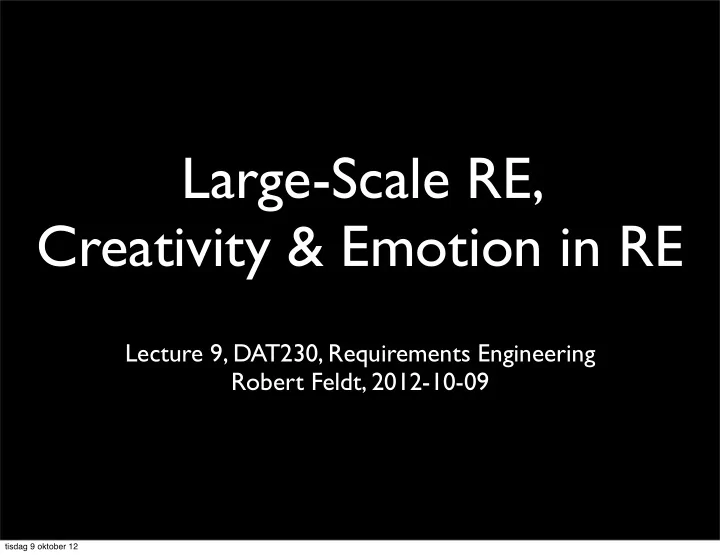

Large-Scale RE, Creativity & Emotion in RE Lecture 9, DAT230, Requirements Engineering Robert Feldt, 2012-10-09 tisdag 9 oktober 12
[Wnuk2009] tisdag 9 oktober 12
LSRE Challenges • Large number of customer requirements • Formal interface to customer • Management of customer expectations • Changing technology • Traceability • Scope change and creep • Resource fluctuation • Prioritization tisdag 9 oktober 12
[Wnuk2009] tisdag 9 oktober 12
[Wnuk2009] tisdag 9 oktober 12
[Wnuk2009] tisdag 9 oktober 12
“Linguistic” LSRE [NattoDag2005] tisdag 9 oktober 12
“Linguistic” LSRE [NattoDag2005] tisdag 9 oktober 12
“Linguistic” LSRE [NattoDag2005] tisdag 9 oktober 12
“Linguistic” LSRE tisdag 9 oktober 12
Creativity in RE Creativity = ability to produce work that is both novel (original, unexpected) and appropriate (useful, adaptive concerning task & constraints) [Sternberg&Lubart1995] tisdag 9 oktober 12
Creativity Workshops for RE [Maiden2007] tisdag 9 oktober 12
Divergent & Convergent Thinking tisdag 9 oktober 12
Divergent & Convergent Thinking Divergent thinking = generate creative ideas through exploring multiple alternatives/ possibilities tisdag 9 oktober 12
Divergent & Convergent Thinking Divergent thinking = generate creative ideas through exploring multiple alternatives/ possibilities Convergent thinking = select “correct” ideas among many alternatives tisdag 9 oktober 12
Divergent thinking • Not correlated with IQ, but with: • nonconformity, curiosity, risk taking, persistence, musicians • Can be promoted through: • creating lists of questions • time “off” to think and meditate • brainstorming • bubble mapping • keeping a journal, free writing (“stream of thought”) • artwork tisdag 9 oktober 12
Three types of creativity tisdag 9 oktober 12
Three types of creativity Exploratory = explore new ideas within a given conceptual space (accepts constraints/ assumptions of given space) tisdag 9 oktober 12
Three types of creativity Exploratory = explore new ideas within a given conceptual space (accepts constraints/ assumptions of given space) Transformational = deliberate transformation or transcendence of a conceptual space (rejects some constraints/assumptions of given space) tisdag 9 oktober 12
Three types of creativity Exploratory = explore new ideas within a given conceptual space (accepts constraints/ assumptions of given space) Transformational = deliberate transformation or transcendence of a conceptual space (rejects some constraints/assumptions of given space) Combinatorial = novel combination of existing ideas as search through space tisdag 9 oktober 12
Four steps of creativity • Preparation - research = collect information/data • Incubation - percolation = milling over collected info • Illumination - light bulb = aha moment • Verification/Implementation - creation = check realism tisdag 9 oktober 12
Maiden Case Study • Two-day workshop to create new reqs/ideas • Product: Air Traffic Management system • Process: • 2 system engineers + domain experts: 4 months to establish high-level spec with scope and goals • 2-day Creativity workshop = 2 facilitators + 2 scribes + 2 external experts + 19 stakeholders • Focus on use case models and texts + I* models tisdag 9 oktober 12
Maiden Case Study • 4 half-day session in 2 days • All ~20 people in one room • Models & text printed on 1m2 pin boards around room • Physical and logical structure of ideas and reqs • Rules: No criticism during divergent periods, time-boxing different topics strictly • Post it notes, colored pens, idea cards at hand tisdag 9 oktober 12
Maiden Case Study Day 1 Day 1 Day 2 Day 2 morning afternoon morning afternoon Brainstorming Expert pres: Reflection Created (system wide & Design of Storyboards use case museum Expert pres: TV for high-prio specific) exhibitions program use cases scheduling Constraint Analogy Combining identification & mapping to Analogy ideas removal ATM & idea mapping & idea creation creation Revised use Brainstorming cases, models given removed Reporting back Reporting back & texts constraints tisdag 9 oktober 12
Analogical mapping/reasoning • Can help Exploratory creativity • Steps: • Find similar domain (source) to target domain • Identify and list mappings between • Agents, Objects, Actions, Constraints, Goals • Use each mapping in turn to create new idea by transforming solution between domains tisdag 9 oktober 12
Constraint removal • Can help Transformational creativity • Steps: • Identify constraints through brainstorming • Divide in small groups • Groups consider new ideas by consecutive removal of constraints until none remains • Report back and put on boards tisdag 9 oktober 12
Storyboarding • Can help Combinational creativity • Steps: • Divide in small groups • Groups have 1 A1 paper with 16 cartoon boxes to describe a scene of a use case • Report back tisdag 9 oktober 12
Case study results tisdag 9 oktober 12
Summary of results • Captured both novel and unoriginal ideas • that were useful and affected SRS • 106 of 140 ideas was useful • 42 of 139 ideas was novel • More effect on abstract goals and concepts than actual reqs • Constraint removal effective but needs more structure • Sometimes hard to record all ideas (“idea blizzards”) • Analogy techniques not very cost-effective tisdag 9 oktober 12
Survey on emotions in games • [Bentley2002] • 303 respondents recruited from gaming mailing lists and from post-grad alumni (no difference between groups) • Younger people than who (in general) play games tisdag 9 oktober 12
Predictors of Enjoyment in games tisdag 9 oktober 12
Further analysis: Affect • Harder to learn => more enjoyment!?? • Real-time strategy+skill games => requires high levels of coordination+reaction speed => pride themselves with it => enjoy harder • Other games: Easier to learn => more enjoyment since mastery depends more on cognitive ability • So depends on system type, goals etc • “When I lost time in a computer game it is a game that I really enjoy. However I recognise losing time as ‘bad’ and therefore losing time itself does not increase my enjoyment, it is a side-effect of my enjoyment”. tisdag 9 oktober 12
How to elicit affective reqs? Contrasting concepts relating to user experience: tisdag 9 oktober 12
Emotion in RE tisdag 9 oktober 12
Recommend
More recommend